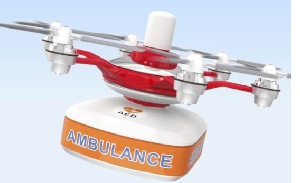 The Drone Health Delivery System is expected to cater for the distribution of medical drugs
The Drone Health Delivery System is expected to cater for the distribution of medical drugs
Parliament yesterday approved the $12.5 million agreement between the Ministry of Health and Fly Zipline Ghana Limited by a majority decision to airlift blood and essential drugs to remote health facilities in the country using drones.
The Minority National Democratic Congress (NDC) in Parliament strongly kicked against the approval and called for a head count to see MPs voting in favour of the agreement and those voting against it.
After the head count, 102 members, mainly from New Patriotic Party (NPP), voted in favour of the agreement while 58 members, who were mainly from the Minority, also voted against the approval.
Elated Majority members who voted for the agreement jubilated after approving the agreement while their colleagues who had done everything to torpedo the contract since it was brought to Parliament on Monday, December 3 for approval, left the chamber to express their displeasure concerning the contract through the media.
After the Minority members raised legal and regulatory issues, as well as the cost implications on December 3, the First Deputy Speaker, Joseph Osei-Owusu, who was presiding at the time, deferred the approval for those concerns raised by the some MPs to be addressed and the necessary changes made in the Health Committee’s report before the approval.
After consensus was reached between Minority and Majority at the committee level yesterday, the Minority still protested against the approval of the agreement, calling for a head count.
Addressing the media after the approval yesterday, the ranking member of the Finance Committee and NDC MP for Ajumako/Enyan/Essiam, Ato Forson, said the Minority abstained from approving the agreement because it strongly believes the deal is a bad one.
According to him, the deal was ‘cooked’ at the Vice President’s Office to benefit some individuals.
He said Zipline would invest less than $5 million in the whole deal and take away a profit of $10 million in three and half years.
“Today is a sad day for Ghana for the Majority to approve of this deal,” he said, stressing that some members of the Majority are not happy about the deal but because of partisanship they have been whipped to approve it.
He said the Minority would meet soon to take its next line of action to force the government to abandon the deal because it’s not in the best interest of Ghanaians.
The ranking member of the Committee of Health and NDC MP for Wa West, Joseph Yieleh Chireh, said the Minister of Finance was left out of the agreement, which was approved by Parliament. According to him, the Minister of Finance should have signed and forwarded the agreement to Cabinet for approval.
He said the Minister of Health rather presented the agreement to Cabinet and convinced it to adopt sole sourcing.
“We are against this contract and will never support this agreement,” he declared.
Reacting to the earlier concerns raised by the Minority, the Director-General of Ghana Health Services (GHS), Dr Anthony Nsial-Asare, said the contract is performance-based and that any payment to Zipline would depend on the magnitude of work and the satisfaction derived from it.
According to him, the government would not directly fund the contract, adding that the Ghana National Petroleum Corporation (GNPC) and Tullow Oil Ghana would provide funds for the project as part of their corporate social responsibilities.
He said the GHS, through the Ministry of Health, is also talking to MTN to help in funding the contract as part of its corporate social responsibility.
Dr Nsiah-Asare maintained that the ministry would pay $88,000 to Zipline per a distribution centre in a month and not $145,000 wrongly quoted by the Minority in Parliament, adding that if in a month 15 deliveries were made, the ministry would only pay $11,000 while 50 deliveries would attract a payment of $27,000.
“We will pay the full $88,000 when 100 or more deliveries are made by the company,” he stated.
The Director-General said that looking at the over 500 health facilities that the drones would be serving, the maximum cost that would be incurred at each health facility for the services would be $175, which is very reasonable.